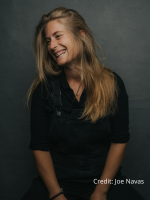About ten years ago when farmer Stephanie Rein’s kids were in elementary school in Truro, she noticed something about local garden-based education:
"There was an incredible amount of money, grant funding for infrastructure, supplies, all the stuff you use to garden. But there was no funding for a garden coordinator or someone to create curriculum or, as we've coined it, the farmer in the school," she said.
As a result, programs would start and stop or only happen in certain grades, and Stephanie realized she wanted to change this. She partnered with a Truro-based non-profit called Sustainable Cape, and put together a farm-based curriculum:
"We started by offering Truro sort of a pilot program—it's a STEAM program—science, technology, engineering, art, mathematics."
Teachers liked it because Stephanie designed it to complement and add to their existing curriculums for these standard subjects, instead of asking them to recreate their lessons. And administrators like it too—from Truro the Farmer in the School has expanded to Wellfleet, Provincetown, and now Eastham, thanks to principles giving it rave reviews.
"When we went into Wellfleet, the only thing that changed within their curriculum or course of study was adding the Farmer in the School. And in the second year the principal reported that their MCAS science scores had gone up."
Science, Stephanie says, is best learned hands-on, and this is what she tries to focus on with the kids — whether they’re spending the day planting seeds or talking about the soil web or doing a lesson on where our food comes from.
"So with like the older kids, we talk about, you know, the distance from the school cafeteria to the school garden and from there to the farmer's market and from there to the Stop and Shop, and then from there to California and Mexico and China and we use a piece of string with a scale of measurement so they, you know, an inch equals, I don't know, ten miles or a mile," Stephani explained.
"And in the end, they see the short piece of string between the cafeteria and the garden and the string to China we couldn’t even do it through the entire school hallway, one kid had to be outside the building and the other kid had to be all the way at the other end of the school."
The lesson gave kids a visual understanding of how far imported food travels, which is key to helping them understand big concepts like carbon footprints and food waste. Other days, they focus on simpler lessons — like learning to connect familiar foods with actual plants.
"In the very beginning when we started, you know, there was a child who said, oh, I don't eat any vegetables. And I said, well, you don't. Do you eat a French fry? Well, yes. Well, where does the French fry come from? It comes from the French fry tree.
That year, Stephanie taught the students how to plant and tend and harvest and eventually cook their own potatoes. And she found very quickly that this sort of hands-on work was a great way to get kids to try foods they might not normally.
"The food they eat is — it's mind-blowing. You know, we did this, um, the great Mustard challenge. And it was in the fall, and I went around to farmers and I, you know, collected five different varieties of mustard: the most mild being, you know, almost like a lettuce and the hottest being hotter than a wasabi pea," she said.
"And so the kids tried the first one. We ranked it, the second one a little spicier. We ranked it the third one. You could see their faces were starting to like, get red. And I just want to remind you, you don't have to do this. It's okay. We've come for. No, we want it. And many of the children went all the way to number five, telling me how great it was as a tear rolled down their face."
The kids still talk about it. I’ve seen this excitement firsthand — my kids started Farmer in the School in kindergarten in Wellfleet, and they’re constantly coming home with stories about what they’ve done in the garden and with seedlings to grow at home. Stephanie Rein says this is at the root of her mission with the program — to connect not only students but also their families to the foods and plants and growers of our place.
"By doing that and having children go home and they're excited to grow food, and their parents are excited to see them. We're affecting change and changing, hopefully the eating habits of our whole community around us."
—
Learn more about Stephanie Rein and the Farmer in the School program: https://sustainablecape.org/programs/farmer-in-the-school-program/










